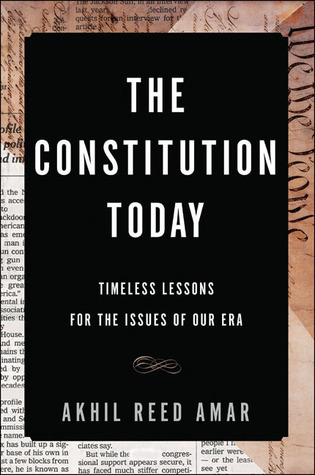 loading
loading
Arts & CultureReviews: November/December 2016Akhil Amar on the Constitution; a Meryl Streep biography.  View full image
Jeffrey Rosen ’91JD is president and CEO of the National Constitution Center and a law professor at George Washington University. His new book is Louis D. Brandeis: American Prophet. In the remarkable career that followed, Amar has become America’s Teacher of the Constitution—through his courses for undergraduates, which have been shared by thousands on Coursera; his many public lectures; and, above all, his popular journalism in magazines like Slate and the New Republic, where he uses contemporary controversies to illustrate enduring constitutional principles. Now he has collected nearly three decades of his work as what he calls a “freelance constitutional journalist” into a new book, The Constitution Today: Timeless Lessons for the Issues of our Era. The danger of any book of collected magazine articles is that it may seem dated and disjointed. But Amar’s collection avoids this hazard because of the historical and constitutional depth of his pieces: each one jumps off the news to illuminate enduring constitutional principles and their contemporary significance. Invoking a tradition of popular constitutionalism that stretches back to the Federalist Papers, which he calls “constitutional commentary written under deadlines,” Amar says that his “overarching mission is, quite simply, to help readers today understand our current Constitution.” In the process, he gives an accessible illustration of the school of constitutional interpretation that he founded and inspired, which he calls “originalism for liberals.” Rejecting the cynical view that constitutional law is merely politics, Amar insists that “there truly are constitutional right answers that can be discovered, with proper constitutional methods.” Although a liberal originalist, Amar is not a strict constructionist: he interprets the structural Constitution and all of its amendments, including those from the Reconstruction eras, to protect broad rights of liberal and equality. “The document’s text, spirit, structure, and enactment history support an indivisible union, a robust right to criticize government officials, a broad set of fundamental rights that no state may abridge, true racial equality in the domains of civil and political rights, and so on.” By reading the Constitution intertextually (in conjunction with other founding documents, such as the Declaration of Independence) and intratextually (by holistically interpreting the same words in different constitutional provisions), Amar arguably introduces possibilities for freewheeling and subjective interpretations that his method is designed to avoid. He answers this criticism by stressing topics in which his own constitutional conclusions diverge from his political views, on questions ranging from gun rights to electoral reform. The collection includes chapters on the modern presidency, with special attention to the resurgence of presidential dynasties; the US Congress, including an enthusiastic endorsement of filibuster reform; and the federal judiciary. He then turns to the Constitution’s role in modern American culture wars, with chapters on criminal procedure. (Amar has long confounded progressives by opposing the exclusionary rule and in this book says he is “nervous” about his “edgiest proposal—calling for the creation of a truly comprehensive and carefully guarded DNA database.”) He also breaks from progressive orthodoxy in endorsing Supreme Court decisions such as Citizens United, which struck down restrictions on free speech during election seasons, and he rewrites the same-sex marriage decision in a way he considers truer to constitutional text and history. The book concludes with chapters on the constitutional issues raised by the impeachment of Bill Clinton ’73JD, the contested election of George W. Bush ’68, and President Obama’s Affordable Care Act. For that last one, it was Amar who urged on the Supreme Court the reasoning that Chief Justice John Roberts would eventually adopt when he voted to uphold the health-care mandate as a tax. When citizens ask for an ideal introduction to the Constitution’s text and history, I often recommend Amar’s scholarly and accessible America’s Constitution. But when they ask for an illustration of how that text and history cast light on the way we live now, I can now recommend The Constitution Today.
|
|